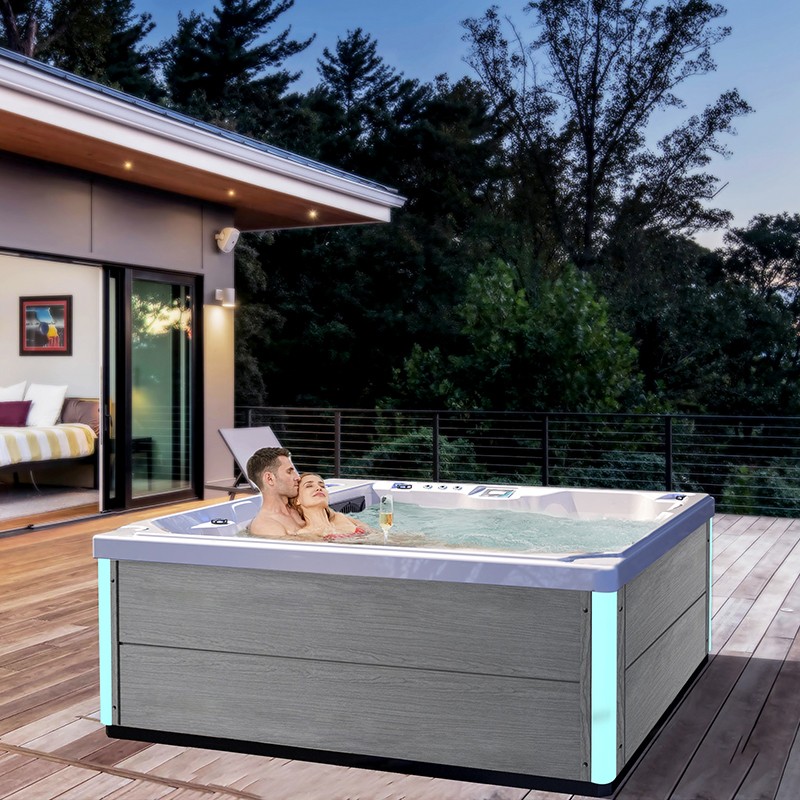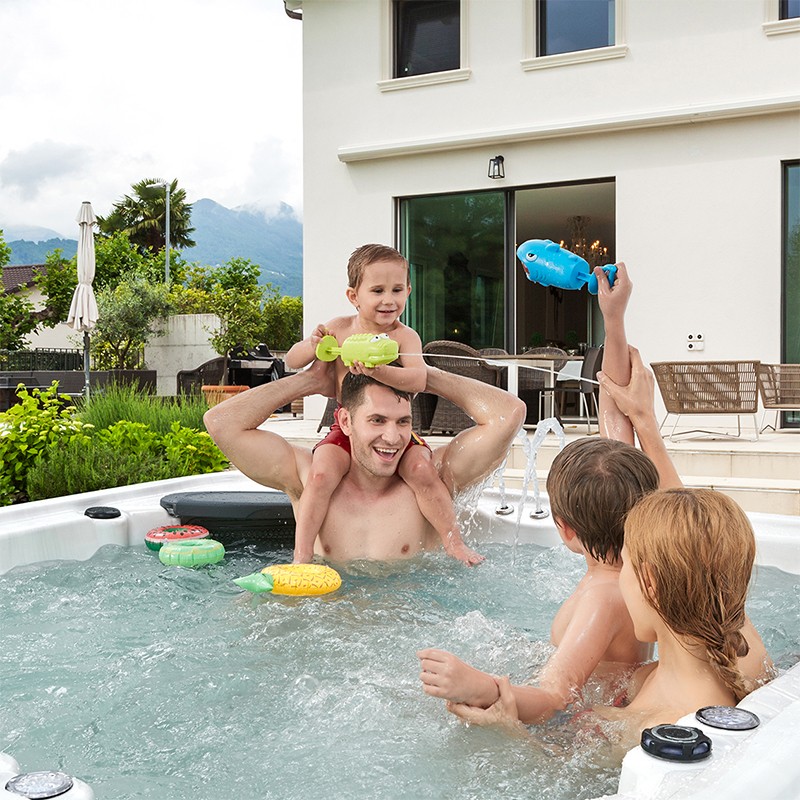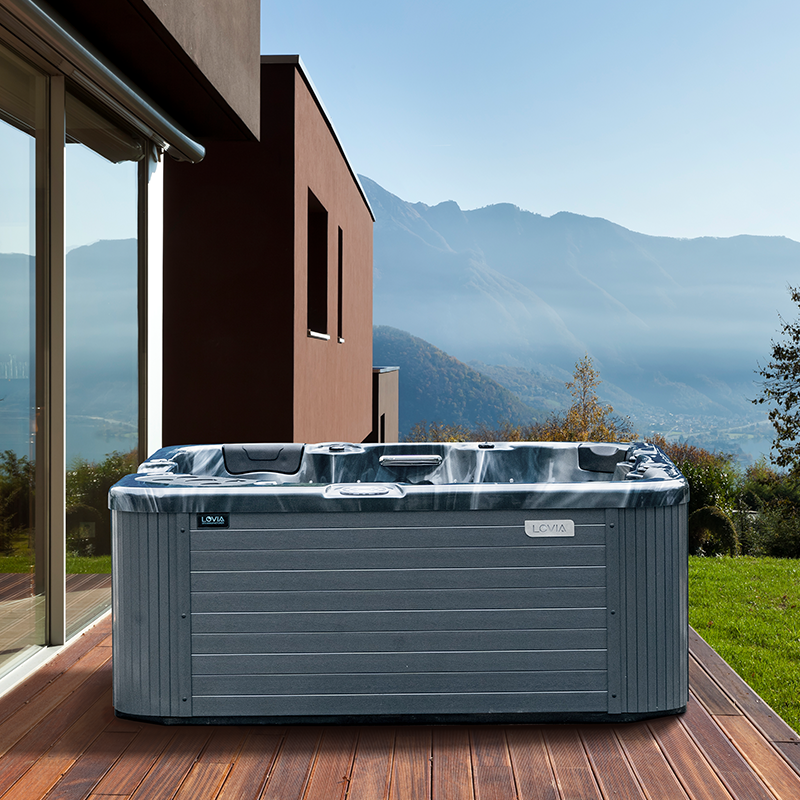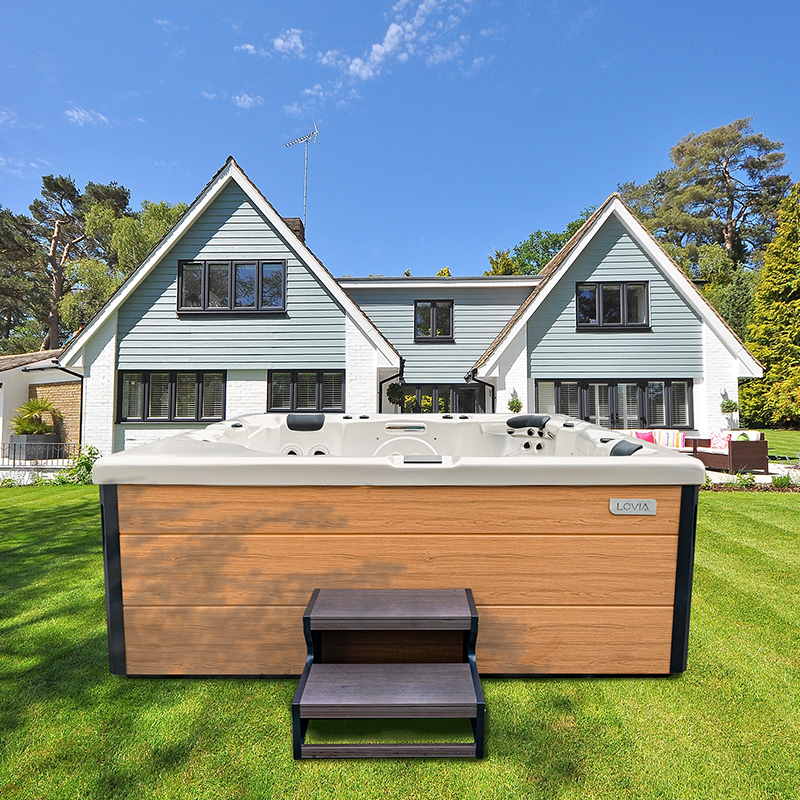
Would you put chlorine in your outdoor spa jacuzzi bathtub?
2025-04-22 15:30An outdoor spa jacuzzi bathtub is a great way to enjoy life, whether it is to relax or socialize, it brings endless comfort to people. However, water quality maintenance is an important part of the use of outdoor spa jacuzzi bathtub, especially keeping the water clean and hygienic. Chlorine, as a widely used water treatment chemical, is often used in water bodies such as swimming pools and hot tubs.
So, is it necessary to put chlorine in an outdoor spa jacuzzi bathtub? What is the role of chlorine? This article will explore these issues in detail and help readers understand how to use chlorine scientifically and safely.

What is the basic principle of chlorine?
Chlorine chemical properties
Chlorine (chemical symbol Cl) is a strong oxidant, usually in gas form, but in water treatment processes, chlorine compounds such as sodium hypochlorite (liquid chlorine) or trichloroisocyanuric acid (solid chlorine) are usually used. These chlorine compounds will quickly decompose in water, releasing hypochlorous acid (HOCl) with strong bactericidal effect, which can quickly destroy the cell walls of bacteria, viruses and other harmful microorganisms, thereby achieving the effect of disinfection and sterilization.
● Hypochlorous acid: Hypochlorous acid is the main active ingredient generated after chlorine dissolves in water, which can effectively kill bacteria, viruses and other harmful microorganisms in water.
● Redox reaction: Chlorine destroys the molecular structure of organic pollutants through oxidation, making them inactive. This strong oxidizing property makes chlorine a very effective disinfectant.
Principle of water treatment of chlorine
In the water treatment process, chlorine usually exists in two forms: free chlorine and combined chlorine. Free chlorine is the active part of chlorine, which can kill pathogens in water; combined chlorine is a compound formed by the combination of chlorine with organic matter or ammonia substances. Its bactericidal ability is weak, but it still has a certain disinfection effect.
● Free chlorine: It is the most effective disinfectant component and can quickly kill microorganisms in water.
● Combined chlorine: Chlorine combined with organic pollutants, although the bactericidal effect is poor, still has a certain residual disinfection ability.
By maintaining an appropriate concentration of free chlorine, we can ensure that pathogens and pollutants in the water do not multiply rapidly, keeping the water clean.

What is the importance of using chlorine in an outdoor spa jacuzzi bathtub?
Unlike swimming pools or indoor bathtubs, outdoor spa jacuzzi bathtubs are exposed to the elements and are often shared by multiple people, so water quality maintenance becomes particularly important. Human skin cells, sweat, oil, cosmetic residues, etc. will enter the water during use, polluting the water quality and increasing the risk of bacterial growth. In addition, pollutants such as dust, leaves, and insects in the outdoor environment will also enter the outdoor spa jacuzzi bathtub, further exacerbating the deterioration of water quality. Therefore, the use of chlorine in outdoor spa jacuzzi bathtubs is very necessary.
Control bacteria and viruses
The main function of chlorine is to kill bacteria and viruses in the water. The water temperature in an outdoor spa jacuzzi bathtub is usually high, especially in the temperature range of 38℃ to 40℃. This warm and humid environment is very suitable for the growth and reproduction of bacteria. If not disinfected regularly, pathogens in the water may multiply rapidly, causing skin infections, eye irritation, respiratory problems, and even more serious diseases. Chlorine ensures the safety of outdoor spa jacuzzi bathtub water by destroying the cell walls of microorganisms and inhibiting the reproduction of bacteria and viruses.
● E. coli and Legionella: These are common pathogens in outdoor hot tubs. If the water is not disinfected properly, these pathogens may cause serious health problems.
● Viruses: Such as cold viruses or other viruses, they may also be transmitted through water. Chlorine can effectively kill these potential viral threats and reduce the risk of infection.
Oxidizing organic substances When the human body uses an outdoor spa jacuzzi bathtub, organic substances such as sweat, skin oils, cosmetics, and hair care products will dissolve in the water. These organic substances will not only reduce the cleanliness of the water, but may also react with chlorine to form combined chlorine, reducing the effective concentration of free chlorine. By using chlorine, these organic pollutants can be quickly oxidized to prevent them from further contaminating the water quality and keep the water clear and transparent.
● Remove impurities: Chlorine can effectively decompose and remove organic impurities such as oil, sweat, etc. in the water to keep the water clean.
● Reduce odor: Organic matter decomposes and produces odors. Chlorine can eliminate these odors through its strong oxidizing properties and maintain the freshness of the water.
Prevent algae growth
Outdoor spa jacuzzi bathtubs are exposed to sunlight, especially in warm and humid environments, where algae can easily grow. If not cleaned in time, green or brown algae may appear in the water, destroying the clarity of the water. Chlorine can effectively inhibit the growth of algae and keep the water clean and transparent.
● Causes of algae growth: Algae usually grow rapidly in a warm, sunny environment with nutrient-rich water.
● Chlorine's inhibitory effect: By maintaining an appropriate chlorine concentration, algae can be prevented from growing in the bathtub, thereby avoiding deterioration of water quality.

How to use chlorine correctly in an outdoor spa jacuzzi bathtub?
Although chlorine has many advantages in keeping the water quality of an outdoor spa jacuzzi bathtub clean, if used improperly, chlorine may also have adverse effects on the human body, such as skin irritation, respiratory problems, etc. Therefore, it is crucial to properly control the amount and method of chlorine use.
Reasonable chlorine concentration
In an outdoor spa jacuzzi bathtub, neither too high nor too low a chlorine concentration is ideal. Too high a chlorine concentration may cause skin and eye irritation, while too low a concentration may not effectively kill bacteria and disinfect. Therefore, maintaining an appropriate free chlorine concentration is key to ensuring water quality and user comfort. Generally speaking, it is recommended to maintain a free chlorine concentration of 2 to 4 ppm (2 to 4 parts per million) in an outdoor spa jacuzzi bathtub, which can ensure effective sterilization without causing significant negative effects on the human body.
● Free chlorine concentration: Ensure that the free chlorine concentration is maintained within the recommended range by testing the water quality regularly. If the chlorine concentration is too low, add an appropriate amount of chlorine to improve the sterilization effect.
● Avoid excessive chlorine: Excessive chlorine concentration may cause skin irritation and respiratory discomfort, so the amount of chlorine must be strictly controlled to avoid excessive use.
Use stabilizers and regulators
In outdoor environments exposed to sunlight, chlorine is easily broken down by ultraviolet rays, which reduces its effectiveness. To prevent this, chlorine stabilizers such as cyanuric acid can be added to the water. Cyanuric acid protects chlorine from UV rays, thus extending its effective time in the water.
● Effect of cyanuric acid: Cyanuric acid slows the decomposition of chlorine, which is especially useful in direct sunlight. It is recommended to control the cyanuric acid concentration between 30 and 50 ppm to ensure the durability of chlorine in outdoor environments.
● pH adjustment: The disinfection effect of chlorine is affected by the pH value of the water. Too high or too low pH values will weaken the bactericidal ability of chlorine. It is generally recommended to keep the pH value of water between 7.2 and 7.8 to ensure the best bactericidal effect of chlorine.
Test water quality regularly
In order to ensure the effective use of chlorine, it is important to test the water quality regularly. By using water quality test strips or test tools, you can detect free chlorine, combined chlorine and pH in the water to determine whether the outdoor spa jacuzzi bathtub water quality is ideal. If the chlorine concentration is too low, you need to add chlorine in time to prevent the water quality from deteriorating; if the concentration is too high, you should take appropriate measures to reduce the chlorine content.
● Water quality testing tools: Using water quality testing tools, you can monitor the chlorine concentration and pH value in the water in real time to ensure stable water quality.
● Timely adjustment: According to the test results, adjust the amount of chlorine and pH value to ensure that the water quality is within a safe range.

Potential risks and alternatives of chlorine
Although chlorine plays an important role in water disinfection, it also has some potential risks. Long-term exposure to high-concentration chlorine water may cause dry skin, eye and respiratory discomfort, especially for sensitive people. Therefore, more and more outdoor spa jacuzzi bathtub users are beginning to look for water treatment methods that replace chlorine, such as ozone disinfection, ultraviolet disinfection, etc.
Potential effects of chlorine on health:
● Skin irritation: High-concentration chlorine water may cause dryness and redness of the skin, especially for people with sensitive skin. Long-term contact with chlorine water may aggravate skin discomfort.
● Eye irritation: Chlorine water can easily cause eye discomfort, especially when the chlorine concentration is too high, which may cause symptoms such as eye stinging and tearing.
Alternatives:
While chlorine is still the most widely used water treatment chemical, some chemical-free alternatives, such as ozone and ultraviolet disinfection, are emerging as new options. Although these methods have advantages in some aspects, they are more expensive to use and require regular maintenance.
Can I get a quote for large wholesale orders?
Yes, we offer personalized quotes for large wholesale orders. Lovia Spa is equipped to handle large-scale purchases and provide competitive pricing for bulk buys. Contact our sales team to receive a tailored quote that meets your exact specifications, including discounts, customization, and more.
